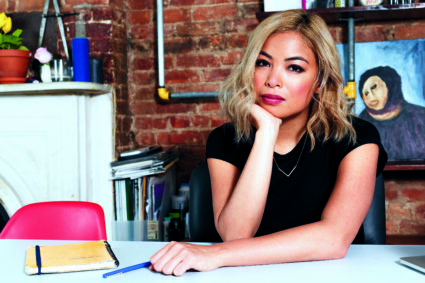
A federal panel reviewing President Donald Trump's plans to build a ballroom at the White House has set April 2…

Shortly after she finished college and before she began writing the essays that would form the backbone of her collection "Trick Mirror," Jia Tolentino bounced a writing idea off one of her professors from the University of Virginia.
"I was doing the whole thing like, 'I don't know, does this sound like it could be good?'" Tolentino recounted to the PBS NewsHour. At some point her professor reminded her that the only way to find out if the idea would hold up on paper was to "actually write it."
"That day freed me from one of the worst traps in both life and writing, where you talk or think about something for so long that you neglect your freedom to just go out and give it a try," Tolentino said.
Below, read more from Tolentino on how she spent time in solitude while working on "Trick Mirror," as well as which works form her personal literary canon.
I've never had one. I've always just written anytime I had a chance, almost compulsively — on planes, on weekends, late at night when other work was done. As a twentysomething, I was aware of having a kind of elasticity and freedom in my day that I wouldn't have forever. Now, I have a 4-month-old baby, and I can feel that it's becoming more necessary to really carve out space for writing in advance.
Writing "Trick Mirror" might actually have been good preparation. During the two years that I was working on it, I was also writing full-time for the New Yorker, so I did get into a pattern where I'd rent little guesthouses in the Catskills for one long weekend at the beginning of every month. These were book getaways, which I'd spend researching, barreling through terrible first drafts, forcing myself to sit down until I felt like I'd gotten somewhere. I loved those weekends; they made me feel like I was both punishing and treating myself at the same time, which is what writing is often like in general. And they did remind me that there's a level of thought and instinct that I don't know how to access without spending a couple of nights alone.
Certain works of reported nonfiction live with such prominence in my personal canon that I almost forget that it's possible that other people might not have read them yet: Adrian Nicole LeBlanc's "Random Family," Matthew Desmond's "Evicted," and Karla Cornejo Villavicencio's "The Undocumented Americans" come to mind immediately, these books where literary beauty and reportorial devotion and political weight are so intertwined. As far as kids books go, E.L. Konigsburg's "The View From Saturday" is an underrated classic.
Not that it was overlooked — it was nominated for the Pulitzer — but the most thrilling piece of art that I've experienced in the pandemic was Will Arbery's play "Heroes of the Fourth Turning," somehow staged brilliantly over Zoom.
Just after I graduated college, I was talking to Christopher Tilghman, who was one of my professors at the University of Virginia, about some idea I had — something I was thinking about writing. I was doing the whole thing like, "I don't know, does this sound like it could be good?" And he sort of succinctly reminded me that the only way to find out was just to actually write it. That day freed me from one of the worst traps in both life and writing, where you talk or think about something for so long that you neglect your freedom to just go out and give it a try.
It was less a moment than a door slowly opening. There were a handful of open-ended questions in my head that started ballooning, to the point that I wanted seven, eight, nine thousand words to meander through them. I started to feel an underlying current connecting these ideas. And then the 2016 election happened, and I started wanting to capture a certain tonal mode of inquiry — to pursue clarity in a way that was still openly flawed, entangled, and confused.
I loved writing "Trick Mirror." Generally, I like writing more than I like having written. But I knew I was done with the book the same way that I know whenever I'm done at a party: when I notice that I'm starting to repeat myself.
Sustain our coverage of culture, arts and literature.